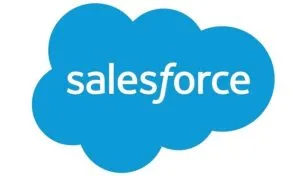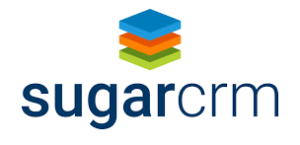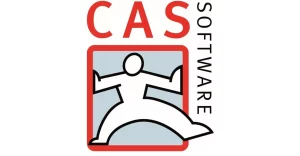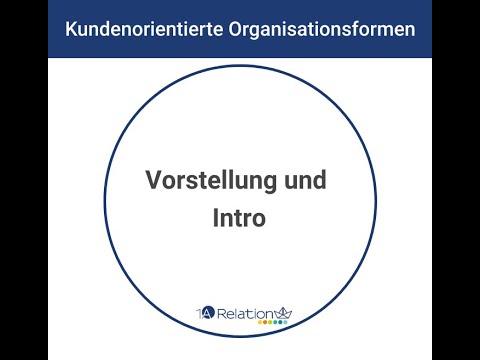Customer orientation requires new forms of organization
Adito has set out in 2021, the goal is not exactly defined. But one thing was clear: the Adito team did not want to continue as before. Jan-Erik Baars, whom I met at the CX Forum, presented excerpts from the field of organizational design. As a professor at the Lucerne University of Applied Sciences and Arts, he teaches this topic and also advises larger companies on it. I myself had the experience of a re-organization in 1993. At that time a bit violent (overnight), but in retrospect I find this experience to be one of the most instructive ever.
In the intro video, the 4 participants briefly introduce themselves, as well as a quintessence of their model or roadmap. These are Patrick Kuglmeier and Tobias Mirwald from Adito, Jan-Erik Baars and Georg Blum.
Many who work on the topics of CRM, CX and UX or customer centric or customer orientation always ask themselves the question: Why is a handbrake involved? Why doesn’t it run even better? The company Bindexis in Switzerland has also thought about this.
And this question is very easy to answer: 95% of all companies are not customer-oriented. But what do a) customer management and b) customer-oriented organizational form mean?
Part 2: Why are we talking about “new forms of organization”?
Tobias Mirwald explains why and how the suffering of Adito arose. He presents various models and approaches. This leads to the first description of the Adito Way. You consciously went and go “your own way”.
Tobias: One size fits all, that’s not the way to go. Get on your way and have the courage to go your own way. The frameworks have advantages and disadvantages, so every company should find the right way for itself.
Quote Patrick: “Our core model is based on Holocracy 5.0. Nevertheless, it is not a pure model.”
Quote Tobias: “There is the new role of personal coaches as developers and promoters in the company.”
Part 3: What does customer management mean? Customer orientation requires new forms of organization
Part 4: Forms of organisation: administration versus design
Jan-Erik: In companies, there is too much administration and too little design at play. The balance is not right. This means that customer orientation is always on the chain or on a leash.
The management is there to create the organizational framework conditions. Management must withdraw.
All approaches are considered by the customer. Or I think from the market.
Part 5: What exactly does this mean in practice?
How long did it take for Adito from the realization to the decision? The anchor Pain was the product management. It was discussed in April/May 2020. Then tried, but only in October 2020 came the realization: That’s not how it works. Eureka, now we have to rethink. In November 2020, Adito came up with the joint decision: This is how we do it. We go on a journey. The goal is roughly clear, but not 100% defined.
Quote Georg: “Already in the Advent calendar ‘Management and the Laws of Nature’ is an important building block: self-organization. Customer orientation only works with freedom of choice, empowerment and self-organization.”
Customer orientation requires new forms of organization
Patrick: Every customer is different, every company is different, but industry solutions are not templates. Adaptation and adaptation is the framework conditions, but the implementation and design is carried out by the team.
Jan-Erik: Nature gives us two fields of action: design and management. Securing as a genetic source. At Pains we try to manage. Unfortunately, the balance between managing and designing is no longer right. Managing is rampant.
Part 6: What is the balance between the old and the new form of organization?
Part 7: Are there differences between small and large companies?
Accordingly Patrick and Tobias: Die Zweigleisigkeit. The internal question: Why do others work differently and I don’t? Transparency is important for both areas. In the hybrid situation, friction occurs. You have to endure them. The conflict must be settled or negotiated individually.
Why don’t we have a big bang? The structures are not destroyed. Despite the friction, it is a familiar environment. Discussion radicalism versus loop approach. We want to embark on a journey. What does the target image look like? We don’t know. Admitting uncertainty is a feat of strength. In the meantime, we are through with it.
Part 8: Who is the customer talking to? Example Gore or GoreTex
Jan-Erik: How can we work together in such a way that the customer likes to come back? Because of all the administration, you lose sight of the customer.
Take Gore, for example, and who acts as a person in negotiations? Sometimes I (according to Tobias) am just a decorative accessory. There is not the boss who says that … Trust (as a manager) in the interests of the customer. You also have to take the environment with you on this journey and create understanding for the change among third parties.
Part 9: Learnings – what are the optimizations and training
Learnings and training: The whole thing stands and falls with a good moderation. Initially external later own facilitators.
It can currently happen with new employees that they are still hired “in the old world”. Other new employees are immediately joining the new structure.
Adito’s goal is to be completely transformed by the end of 2022. That’s 2 years of transformation process.
The HR department gets a new role. HR should manage less and design more. HR professionals can find a new role. Facilitation of cooperation. At Adito, that’s people and culture. “One Adito” is part of the circle of “Man and Culture”.
Part 10: Conclusion, summary and closing words on customer orientation require new forms of organization
“Our actions become an experience for the customer!
We are not the bird of paradise, but we are rare, courageous, but on a path that is confirmed (even today by Jan-Erik and Georg).
Quote Tobias: “This ‘one size fits all’ does not exist. Encourage to make your own way, a Wolpertinger. We shied away at the beginning, but little by little there was a solution. Dare to do it. Thinking from the market and the customer.”
Quote Jan-Erik: “Successful organizations have a purpose, not just ‘making money’. It’s about dialogical leadership.”
The famous example of Ritz Carlton:
“We are Ladies and Gentlemen are serving Ladies and Gentlemen” is the design of the company.
Thank you very much for the open, very exciting interview. To be continued.
Note: This is a machine translation. It is neither 100% complete nor 100% correct. We can therefore not guarantee the result.










 CAS Software AG ist Marktführer für Kundenbeziehungsmanagement (CRM) im deutschen Mittelstand. Ob Marketing, Vertrieb oder Service – Anwender profitieren von effizienten Prozessen auf einer einheitlichen Datenbasis.
CAS Software AG ist Marktführer für Kundenbeziehungsmanagement (CRM) im deutschen Mittelstand. Ob Marketing, Vertrieb oder Service – Anwender profitieren von effizienten Prozessen auf einer einheitlichen Datenbasis.





